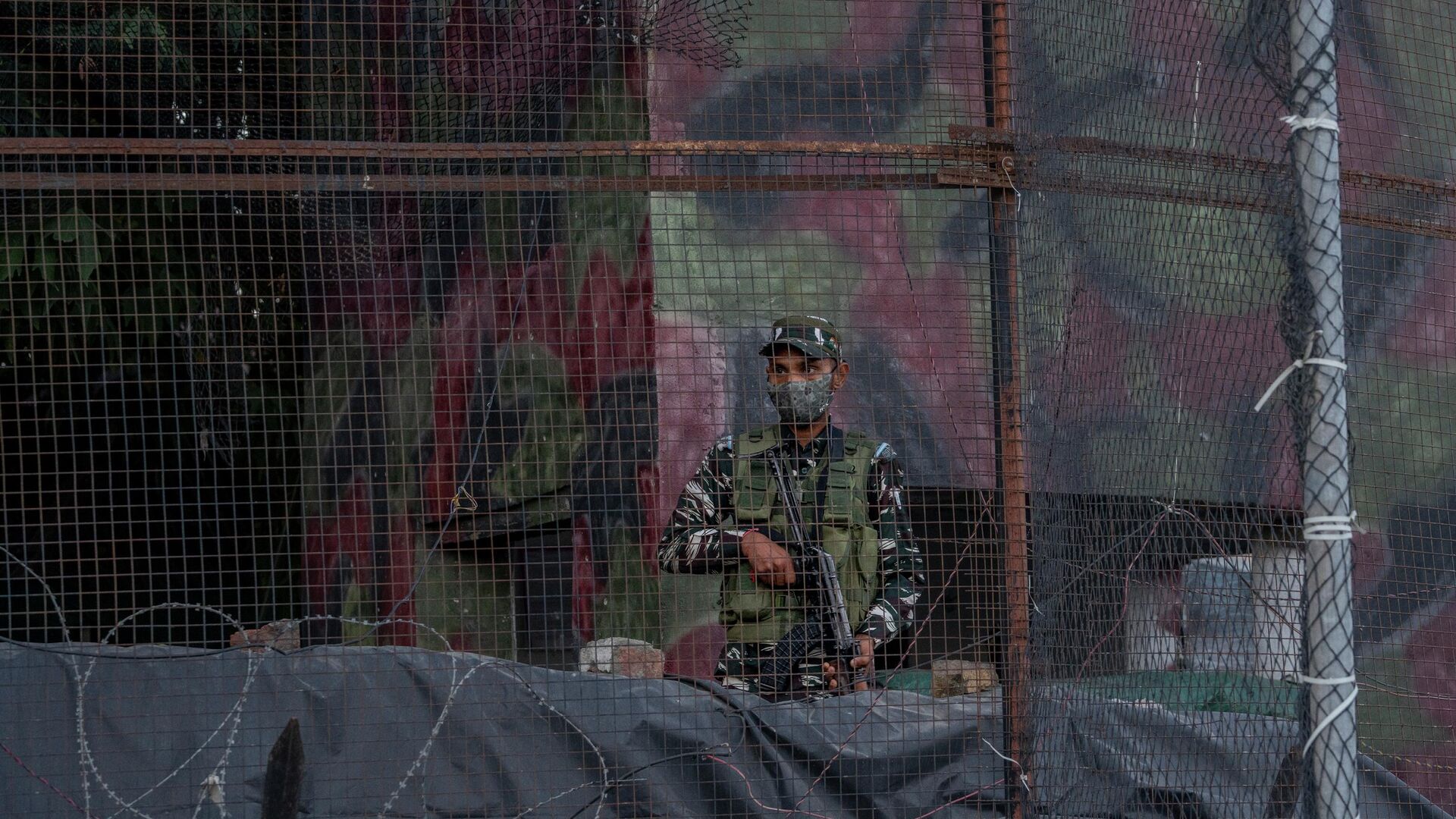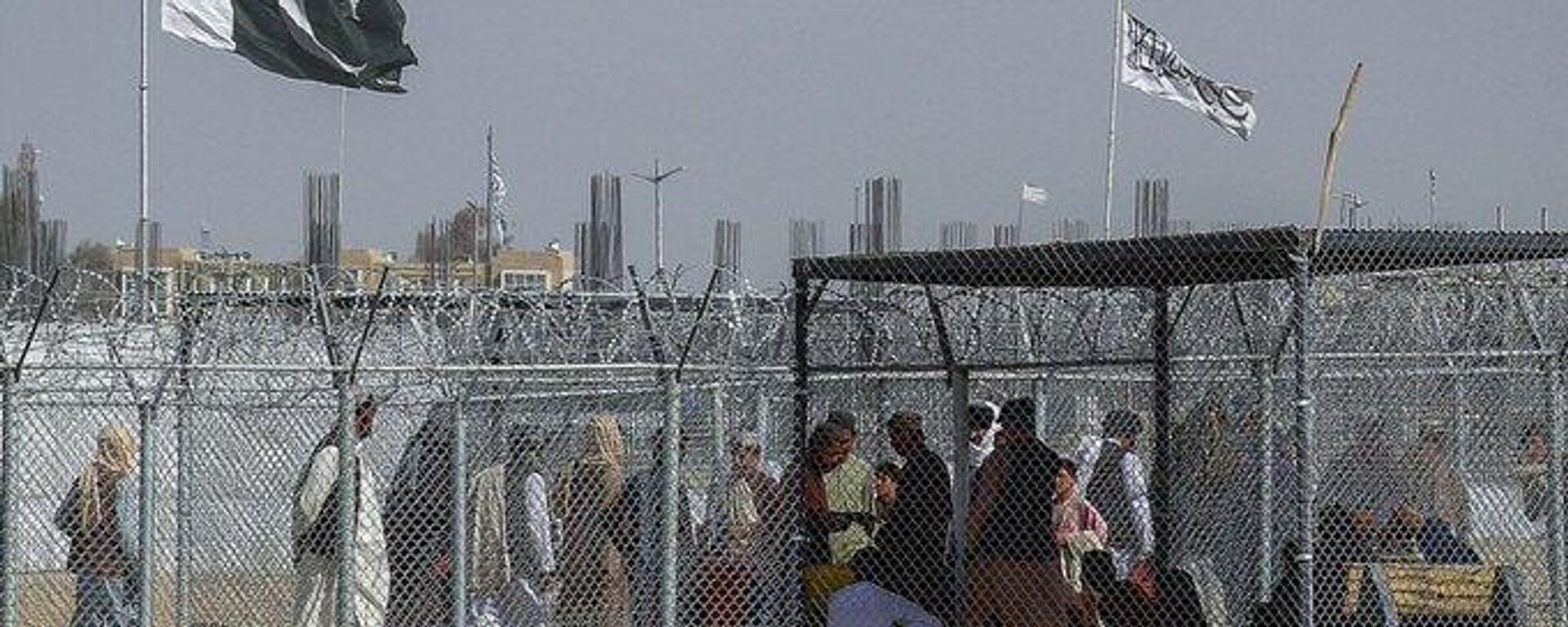https://sputniknews.in/20230726/why-new-militant-group-in-balochistan-is-threat-to-chinas-cpec-3188978.html
Why New Militant Group in Balochistan Is Threat to China's CPEC
Why New Militant Group in Balochistan Is Threat to China's CPEC
Sputnik India
Pakistan has recently witnessed a surge in terror activities in Balochistan and KPK province. A group called Tehreek-e Jihad Pakistan (TJP) has claimed responsibility for the recent terrorist attacks.
2023-07-26T21:29+0530
2023-07-26T21:29+0530
2023-07-27T18:19+0530
pakistan
south asia
pakistan army
terrorism
terror outfits
terrorist attack
counter-terrorism
china-pakistan economic corridor (cpec)
tehreek-e-taliban pakistan (ttp)
taliban
https://cdn1.img.sputniknews.in/img/07e6/0c/10/128414_0:231:3072:1959_1920x0_80_0_0_ab63bbe428b3c65e45f3a06f431197eb.jpg
A group of some 20 militants launched an attack on the military base in the northern Zhob district of Balochistan province, which borders Afghanistan, on July 13. Pakistan's armed forces stationed at the base fought back, losing nine soldiers with seven armed militants also getting killed.A group calling itself Tehreek-e Jihad Pakistan (TJP) claimed responsibility for this bloody attack on the Zhob garrison. The district falls on the Quetta-Dera Ismail Khan highway, part of the western route of the China-Pakistan Economic Corridor (CPEC).The CPEC passes through Pakistan’s Balochistan province, which has been plagued by separatist insurgency and terrorist attacks for years and with the rise of the new group TJP this risk is further aggravated.Infrastructure RisksThe rise of the new terror group is a matter of grave concern for both Pakistan and China given that the security situation in Pakistan is already sensitive, with frequent terror and violent attacks targeting both Chinese and Pakistani nationals working on CPEC projects. In July 2021, a terrorist attack on the Dasu Dam hydropower project resulted in the death of ten Chinese and the wounding of another 26. It was the worst terror attack against Chinese in recent years.On April 26 last year, a female suicide bomber killed four people near Karachi University’s Confucius Institute, among which were three Chinese nationals who were teachers at China’s official institute for enhancing cultural communications overseas.The Baloch Liberation Army (BLA), the separatist group from Balochistan, claimed responsibility for this attack against Chinese nationals.Such examples of previous attacks on the CPEC projects and Chinese nationals highlight the risks of the situation, and with the rise of TJP there has been an uptick in terror activities, especially in Khyber Pakhtunkhwa and Balochistan. Many believe that the TJP is an extension of the Tehreek Taliban Pakistan (TTP) with whom the government ended its ceasefire in November last year.China’s Investment in PakistanMeanwhile, China has been involved in major mining and infrastructure projects in Pakistan. Figures presented by the Chinese ambassador to Pakistan stated that after more than 8 years construction, CPEC has brought direct investment totaling $25.4 billion, while 46 projects have been completed or under construction.Pakistani officials also predict that CPEC will result in the creation of upwards of 2.3 million jobs between 2015 and 2030 and add 2 – 2.5% to the country’s annual economic growth.CPEC is also invested in the resource-rich but turbulent province of Balochistan, including the deep-water Gwadar port, and the province's vast gold and copper mines, including the Reko Diq gold mine.Hence, despite the hardships, CPEC is making great progress and Pakistan's President Arif Alvi and former Chinese Foreign Minister Qin Gang held a meeting last month and reaffirmed their resolve to work together to promote regional peace and prosperity, as well as jointly cope with external challenges.Alvi told the Chinese diplomat that Pakistan-China relations were “rooted in mutual trust” and understanding. The Chinese minister was quoted in the statement as saying their nations were “all-weather friends” whose friendship “was as solid as a rock.”However, the threat of terrorism means more security protocols and heavier investment into providing safety to the Chinese nationals, as Beijing recently demanded greater security for its citizens in Pakistan after a series of deadly attacks.Warning of an Effective Response to TerrorismThe risk of militants damaging the CPEC infrastructure, in turn causing damage to the reputation of Pakistan's armed forces as they are responsible for providing security to the critical objects of the project, has prompted Islamabad to demand from the Taliban* in Kabul that they do more to control and rein in anti-Pakistani groups such as the Tehreek-e-Taliban** Pakistan.Last Friday, Pakistan’s military chief warned the Afghan Taliban of an “effective response” by his forces if they fail to stop harboring militants who plot cross-border attacks from Afghanistan.General Asim Munir said that Pakistan’s armed forces were seriously concerned about the “safe havens and liberty of action” the Pakistani Taliban have in Afghanistan, adding that he expects the Afghan Taliban to live up to their promises from a 2020 agreement with Washington in Doha, to ban any terror group from using Afghan soil for attacks.As a result, it is important to strengthen security measures along the CPEC routes, as well as to improve local security conditions through economic development and social stability.* under UN sanctions for terrorism** terror groups banned in Russia
https://sputniknews.in/20230621/china-and-pakistan-ink-34-billion-deal-to-build-nuclear-power-plant-2591772.html
https://sputniknews.in/20230718/with-friction-mounting-pakistan-slams-taliban-for-abetting-terror-groups-3049673.html
pakistan
south asia
china-pakistan economic corridor (cpec)
Sputnik India
feedback.hindi@sputniknews.com
+74956456601
MIA „Rossiya Segodnya“
2023
Aneela Rashid
https://cdn1.img.sputniknews.in/img/07e6/0c/0d/74548_0:0:485:484_100x100_80_0_0_821526e967ae85d041e2d30ee34fa1de.jpg
Aneela Rashid
https://cdn1.img.sputniknews.in/img/07e6/0c/0d/74548_0:0:485:484_100x100_80_0_0_821526e967ae85d041e2d30ee34fa1de.jpg
News
en_IN
Sputnik India
feedback.hindi@sputniknews.com
+74956456601
MIA „Rossiya Segodnya“
Sputnik India
feedback.hindi@sputniknews.com
+74956456601
MIA „Rossiya Segodnya“
Aneela Rashid
https://cdn1.img.sputniknews.in/img/07e6/0c/0d/74548_0:0:485:484_100x100_80_0_0_821526e967ae85d041e2d30ee34fa1de.jpg
why new militant group in balochistan is threat to china's cpec, china-pakistan relations, taliban, terrorism, counter-terrorism
why new militant group in balochistan is threat to china's cpec, china-pakistan relations, taliban, terrorism, counter-terrorism
Why New Militant Group in Balochistan Is Threat to China's CPEC
21:29 26.07.2023 (Updated: 18:19 27.07.2023) Pakistan has recently witnessed a surge in terror activities in Balochistan and KPK province. A group called Tehreek-e Jihad Pakistan (TJP) has claimed responsibility for the recent terrorist attacks.
A group of some 20 militants launched an attack on the military base in the northern Zhob district of Balochistan province, which borders Afghanistan, on July 13. Pakistan's armed forces stationed at the base fought back, losing nine soldiers with seven armed militants also getting killed.
A group calling itself Tehreek-e Jihad Pakistan (TJP) claimed responsibility for this bloody attack on the Zhob garrison. The district falls on the Quetta-Dera Ismail Khan highway, part of the western route of the China-Pakistan Economic Corridor (CPEC).
The
CPEC passes through Pakistan’s Balochistan province, which has been plagued by separatist insurgency and terrorist attacks for years and with the rise of the new group TJP this risk is further aggravated.
The rise of the new terror group is a matter of grave concern for both Pakistan and China given that the security situation in Pakistan is already sensitive, with frequent terror and violent attacks targeting both Chinese and Pakistani nationals working on CPEC projects.
In July 2021, a terrorist attack on the Dasu Dam hydropower project resulted in the death of ten Chinese and the wounding of another 26. It was the worst terror attack against Chinese in recent years.
On April 26 last year, a female suicide bomber killed four people near Karachi University’s Confucius Institute, among which were three Chinese nationals who were teachers at China’s official institute for enhancing
cultural communications overseas.
The Baloch Liberation Army (BLA), the separatist group from Balochistan, claimed responsibility for this attack against Chinese nationals.
Such examples of previous attacks on the CPEC projects and Chinese nationals highlight the risks of the situation, and with the rise of TJP there has been an uptick in terror activities, especially in Khyber Pakhtunkhwa and Balochistan.
Many believe that the TJP is an extension of the Tehreek Taliban Pakistan (TTP) with whom the government ended its ceasefire in November last year.
China’s Investment in Pakistan
Meanwhile, China has been involved in major mining and
infrastructure projects in Pakistan. Figures presented by the Chinese ambassador to Pakistan stated that after more than 8 years construction, CPEC has brought direct investment totaling $25.4 billion, while 46 projects have been completed or under construction.
Pakistani officials also predict that CPEC will result in the creation of upwards of 2.3 million jobs between 2015 and 2030 and add 2 – 2.5% to the country’s annual economic growth.
CPEC is also invested in the resource-rich but turbulent province of Balochistan, including the deep-water Gwadar port, and the province's vast gold and copper mines, including the Reko Diq gold mine.
Hence, despite the hardships, CPEC is making great progress and Pakistan's President Arif Alvi and former Chinese Foreign Minister Qin Gang held a meeting last month and reaffirmed their resolve to work together to promote regional peace and prosperity, as well as jointly cope with external challenges.
Alvi told the Chinese diplomat that Pakistan-China relations were “rooted in mutual trust” and understanding. The Chinese minister was quoted in the statement as saying their nations were “all-weather friends” whose friendship “was as solid as a rock.”
However, the threat of terrorism means more security protocols and heavier investment into providing safety to the Chinese nationals, as Beijing recently demanded greater security for its citizens in Pakistan after a series of deadly attacks.
Warning of an Effective Response to Terrorism
The risk of militants damaging the CPEC infrastructure, in turn causing damage to the reputation of Pakistan's armed forces as they are responsible for providing security to the critical objects of the project, has prompted Islamabad to demand from the Taliban* in Kabul that they do more to control and rein in anti-Pakistani groups such as the Tehreek-e-Taliban** Pakistan.
Last Friday, Pakistan’s military chief warned the
Afghan Taliban of an “effective response” by his forces if they fail to stop harboring militants who plot cross-border attacks from Afghanistan.
General Asim Munir said that Pakistan’s armed forces were seriously concerned about the “safe havens and liberty of action” the
Pakistani Taliban have in Afghanistan, adding that he expects the Afghan Taliban to live up to their promises from a 2020 agreement with Washington in Doha, to ban any terror group from using Afghan soil for attacks.
As a result, it is important to strengthen security measures along the CPEC routes, as well as to improve local security conditions through economic development and social stability.
* under UN sanctions for terrorism
** terror groups banned in Russia




